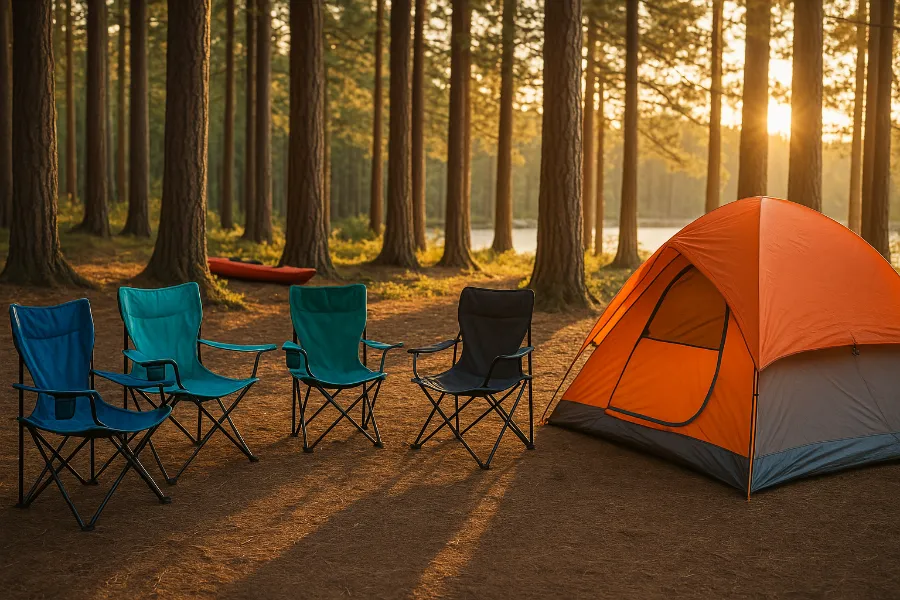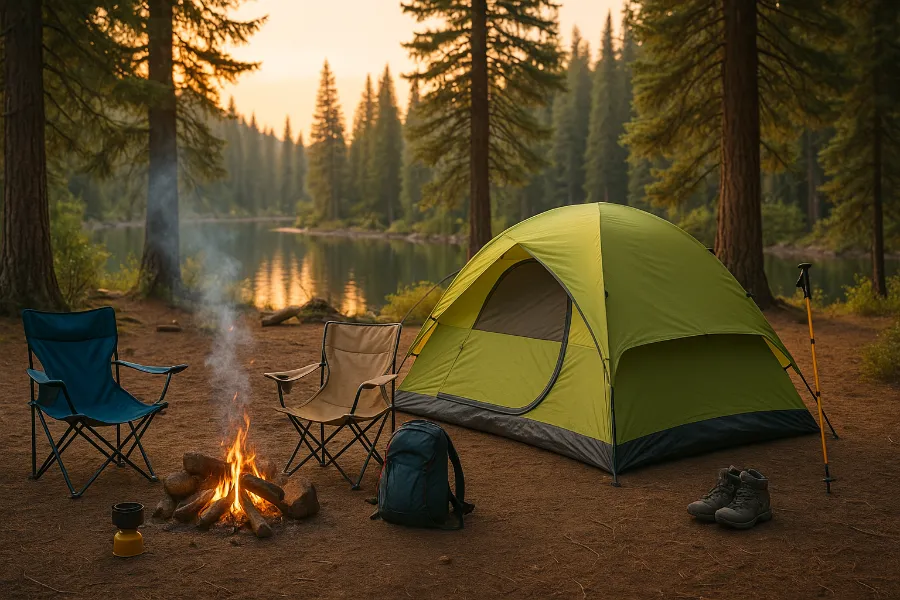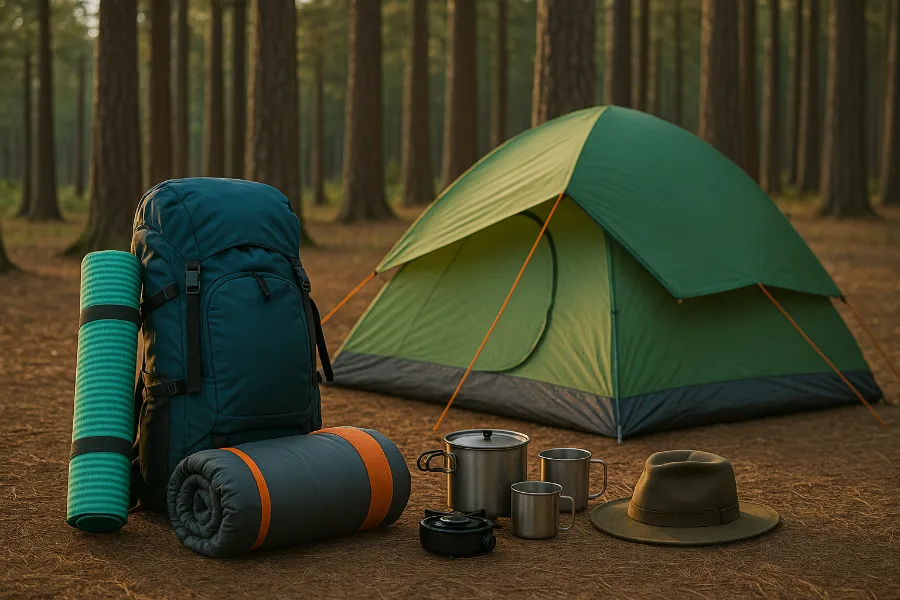When planning a camping trip, one of the biggest questions isn’t where you’ll go or what meals you’ll cook—it’s whether you should rent or buy your camping gear. The choice can shape not only your budget but also how much you enjoy your time outdoors. Deciding on the best camping gear to rent vs buy comes down to balancing cost, convenience, and long-term use. Let’s break it all down so you can head into your next adventure fully prepared..

Why the Rent vs Buy Decision Matters
Camping can be as budget-friendly or as gear-heavy as you make it. But the wrong choice—renting something you should’ve bought, or investing in equipment you’ll rarely use—can waste money and add stress. Renting can give you flexibility, while owning provides reliability and personalization. The good news? You don’t need to go “all in” one way or the other. By knowing which items are smarter to rent and which are worth buying, you can build a kit that works for your lifestyle and wallet.
The Pros and Cons of Renting Camping Gear
Renting camping gear is a smart way to get started without committing to expensive purchases.
Advantages of Renting
- Lower upfront costs – Perfect for beginners who aren’t sure if they’ll stick with camping.
- Variety and flexibility – Try different types of tents, sleeping bags, or specialty gear without committing.
- No maintenance – You return the gear after use, no need to worry about cleaning or storage.
Disadvantages of Renting
- Costs add up – Renting several times a year can quickly exceed the price of buying.
- Inconsistent quality – Rental gear has been used by many others and may show wear.
- Limited personalization – You might not get the exact fit or features you prefer.
- Availability issues – Popular gear may be booked out during peak camping season.
The Pros and Cons of Buying Camping Gear
On the flip side, owning your gear gives you freedom and control.
Advantages of Buying
- Long-term savings – Once you buy, the cost per use drops significantly.
- Always ready – No need to worry about availability or reservations.
- Personalized fit – You can choose items that match your style, comfort, and body type.
- Durability – Quality gear, when maintained, can last for years.
Disadvantages of Buying
- Upfront expense – Buying gear, especially tents and sleeping bags, can feel expensive.
- Storage needs – Camping gear takes up space in your home or garage.
- Maintenance – Cleaning, repairing, and storing properly are your responsibility.
- Risk of underuse – If you don’t camp often, the gear may collect dust.
Best Camping Gear to Rent

Not all gear is worth purchasing, especially if you’re new to camping or space is tight. Here’s what’s often smarter to rent:
Camp Chairs
A camp chair is an easy rental option. They’re bulky, and you may want to test a few before committing. Renting lets you find the most comfortable style without buying multiple models.
Specialty Equipment
Think snowshoes, paddle boards, kayaks, or climbing gear. These are expensive, highly specialized, and not always needed for every trip. Renting saves money while giving you access to well-maintained gear.
Bikes
Renting a bike can be more affordable if you need a specialty ride like a mountain or fat-tire bike. For occasional use, renting beats storing and maintaining an expensive bike at home.
Bear Cans
Required in many backcountry areas, bear-proof containers are bulky and not something you’ll use often. Renting them makes sense if backpacking isn’t a regular activity.
Backpacks
High-quality backpacks are pricey, and fit is everything. Renting first lets you experiment with different sizes and styles before investing in your own.
Best Camping Gear to Buy
Some items are worth the investment right from the start. These essentials will pay off quickly if you camp more than once or twice a year.
Tent
A tent is your home in the outdoors. Buying your own ensures comfort, reliability, and familiarity with setup. Whether you choose a lightweight backpacking tent, a roomy cabin tent, or a four-season option, owning is almost always better long-term.
Sleeping Bag
A quality sleeping bag keeps you warm, safe, and comfortable. Rental bags may not match your comfort needs or hygiene standards. Buying your own means choosing the right insulation and temperature rating for your style of camping.
Sleeping Pad
A good pad makes a world of difference in comfort and warmth. Since they’re relatively affordable and highly personal in preference, buying is the smarter move.
Cooking Equipment
Owning a simple stove, cookware, and utensils ensures you’re ready whenever a camping trip arises. These items are affordable, and you’ll likely use them often enough to justify the purchase.
Water Filters
Portable filters like LifeStraw or Sawyer Squeeze are inexpensive and essential. Since they’re compact and personal-use items, owning is far more practical than renting.
Footwear
Hiking boots or trail shoes are something you should always buy. Proper fit prevents blisters and injuries, and you’ll use them for more than just camping.
Headlamps
A small, reliable headlamp is versatile enough for both camping and everyday use at home. Lightweight, inexpensive, and long-lasting—it’s an easy buy.
Key Factors to Consider Before Deciding
When weighing the best camping gear to rent vs buy, keep these factors in mind:
- Frequency of use – How many trips per year do you realistically plan?
- Storage space – Do you have room for bulky items like tents and bikes?
- Budget – Can you handle the upfront investment, or would smaller rental costs fit better?
- Resale potential – High-quality gear can be sold later if you change your lifestyle.
- Sustainability – Renting reduces waste and promotes resource sharing.
How to Offset Costs: Renting Out Your Gear

Buying gear doesn’t mean it has to sit unused. Platforms like GeerGarage allow you to rent out your equipment when you’re not using it, creating passive income. This way, you can offset upfront costs while helping others enjoy the outdoors affordably.
Conclusion: A Balanced Approach
The best camping gear to rent vs buy depends on your camping style, budget, and lifestyle. For most campers, a hybrid approach makes sense—buying essentials like tents, sleeping bags, and footwear while renting specialized gear for occasional adventures. By making smart decisions upfront, you’ll set yourself up for memorable trips without unnecessary expenses.
Camping doesn’t have to mean an expensive shopping spree. With the right strategy, you can enjoy the outdoors comfortably, sustainably, and affordably.
